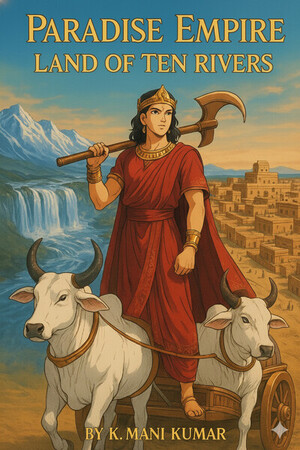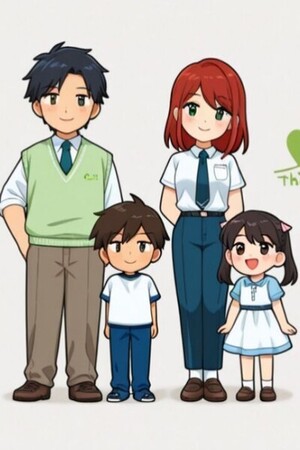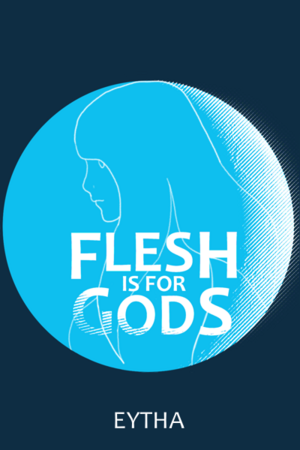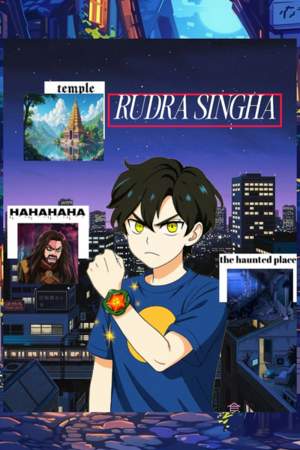Chapter 11:
Chapter 4: The Heart of Civilization — Part 2: Call from the Temple
The Paradise Empire: The Land of Ten Rivers season 1 part 1
Paradise Empire: The Land of Ten Rivers
Chapter 4: The Heart of Civilization — Part 2: Call from the Temple
(Scene opens: The massive, imposing Main Gates of the Lower City of Maniyanūru. The sun is high, casting long, sharp shadows.)
The journey from the hill had been a descent into a golden dream, but now, the reality of the great city stood before them in the form of bronze and brick. The gates of Maniyanūru were not merely an entrance; they were a statement. Thirty feet high and reinforced with bands of iron, they stood open, swallowing the stream of travelers, merchants, and pilgrims.
Vīra pulled on the reins, guiding his bulls to the checkpoint. A squad of city guards, wearing the distinct leather and bronze armor of the Lower City patrol, stepped forward, their spears crossed to bar the way.
The lead soldier, a burly man with a scar running down his cheek, looked at the bulls, then his eyes drifted to the chariot. His jaw went slack. He walked around the vehicle, running a hand hovering over the wood, afraid to touch it.
Soldier: "By the ten rivers... hold on. A chariot made of Red Sandalwood? And fitted with bronze-wood composite wheels?"
The other soldiers gathered around, their boredom replaced by bewilderment. They were used to the heavy, clanking bronze war chariots or the rough, creaking teak carts of merchants. This vehicle was sleek, dark, and polished to a mirror finish.
Soldier: "It looks different than our standard bronze chariots. It’s lighter, yet... it looks stronger. Where did you buy this, traveler? Is this a foreign import from the coastal lands?"
Vīra and Tim’mayya exchanged a quick look. Vīra smiled humbly.
Vīra: "No, sir. We did not buy it. We built it. In our village of Manūru."
The soldiers looked at each other, stunned.
Soldier: "You... built this? In a farming village?" He shook his head in disbelief, then walked to the back to inspect the four-wheeled cargo wagon connected to the chariot. He checked the grain sacks and the bundles of cotton. Finding nothing illicit, he stepped back and waved them through, a look of lingering respect in his eyes.
Soldier: "Go on. Welcome to Maniyanūru."
Vīra flicked the reins. "Hah!"
The bulls surged forward, and they passed beneath the massive archway.
(Scene shifts: Inside the Lower City. The visual splendor is overwhelming.)
As they emerged from the shadow of the gatehouse, the city revealed itself. It was a blinding spectacle. The mid-day sun struck the hundreds of golden gopurams (temple towers) that dotted the landscape. The light cascaded from the Higher City on the plateau, down to the Middle City, and finally bathed the Lower City in a divine, golden glow.
The streets were paved with smooth stone. To their left and right, buildings of red brick and white plaster rose three stories high.
Tim’mayya leaned in, his voice lowered to a whisper, intimidated by the sheer scale of it all.
Tim’mayya: "Vīra... keep moving. We need to get to the marketplace immediately to secure a spot. If we delay, we will lose the right place, and we’ll be stuck selling on the outskirts."
Vīra nodded, his eyes scanning the layout. He directed the chariot toward the wide central avenue that led to the Great Market.
Tim’mayya (nervously): "Maybe... maybe we can't go into the market like this. Look at your chariot, Vīra. It stands out too much. We might attract a crowd, and we could get stuck."
Vīra: "We can’t leave the chariot here, Tim’ma. It holds our goods. And if we leave it unattended—"
Tim’mayya (interrupting): "Stole it? Impossible. This is Maniyanūru. The laws here are absolute. If anyone steals a man’s goods or tools of trade, they face death. But you are right... we must keep it with us."
They navigated the streets. Luck was on their side. It was mid-day. The morning rush of locals buying daily vegetables was over, and the evening rush of the festival crowds had not yet begun. The market was breathing, waiting.
(Scene shifts: The Great Marketplace.)
They entered the heart of the Lower City. The marketplace was a vast square, lined with permanent stone stalls and shaded by colorful cloth awnings. The scent of jasmine, roasting spices, and fresh damp earth filled the air.
As Vīra guided the bulls deeper into the rows of merchants, he spotted a familiar banner. A group of men were unloading sacks of high-quality rice from a large ox-cart. Standing with his hands on his hips, barking orders, was a man they knew well.
Vīra grinned. He cupped his hands around his mouth.
Vīra (shouting): "Ōōōōy! Rangayya!"
The man turned sharply. Rangayya, the son of the Manūru village chief, squinted against the sun. When he recognized the red sandalwood chariot, his face dropped.
Rangayya: "Amma ni! Vīra! Oh, in the name of Vīrayya and Śāntam'ma, not him again! Not here too!"
Rangayya’s men stopped working and stared. Vīra pulled his chariot up alongside them, the wheels coming to a smooth halt.
Rangayya looked Vīra up and down, crossing his arms. He wore a silk tunic, trying to look the part of a city merchant, but the village dust was still on his sandals.
Rangayya: "Vīra. What are you doing here? Why are you here?"
Vīra (cheerfully): "I came for the same reason you did, Rangayya. To trade and earn something. Of course!"
Tim’mayya poked his head out from behind Vīra.
Tim’mayya: "Why, Rangayya? Why are you worried to see Vīra here? You should be proud! A boy from our village, standing here in the capital. He is .....
Rangayya’s servants muttered loudly: "Pride of Manūru!"
Rangayya snapped his head back. "Shut up, you fools!" He turned back to Tim’mayya, his eyes narrowing. "I know that, Tim’ma. But tell me... did Vīra come here as your tail, or are you Vīra's tail now?"
Vīra and Tim’mayya looked at each other. The dynamic had indeed shifted during the journey, but neither cared for the insult.
Rangayya stepped closer, leaning on Vīra’s chariot wheel. "Anyway, listen to me. Don't try to compete with me in business. Do you both get it? Vīra, you already stole my fame in the village with your wrestling and your fancy ideas. Don't try to steal my wealth too. Do you get it?"
Vīra chuckled, shaking his head. "Why would I do that, Rangayya? We are friends, right? Brothers from the same soil."
Rangayya scoffed. "Oh yes. I am the son of the Village Chief. You two are the sons of farmers. And we are 'friends.' Interesting dynamics, by the way."
Suddenly, Vīra grimaced. He reached up, gripping his right shoulder. Through the tunic, the Horned White Horse symbol began to pulse with a rhythmic, dull red light. It wasn't pain, exactly—it was pressure. Like a heavy hand gripping him.
Rangayya and his men stepped back. Tim’mayya looked concerned.
Rangayya: "What’s wrong, Vīra? You look pale."
Vīra: "I don’t know... pain in my right shoulder."
Tim’mayya: "He has had this since we arrived at the hill. I don’t get it. We didn’t have any problems throughout the journey."
Rangayya waved his hand dismissively. "The long journey might be the reason. The nerves get twisted holding reins for that long. Listen to me now. You are wasting time. You both need to find the Nagara Vyapar Nayaka (City Trade Leader)."
Vīra looked up, gritting his teeth against the throbbing sensation. "Who?"
Rangayya: "The official. You must register your names in the records. He will give you a seal with a symbol. That symbol decides your luck—it tells you where your spot in the market is. Go fast! For your information, we got our right at the Temple Street! Right near the entrance. Prime location. So don't get late, or you'll be selling near the dung heaps. After that, find a room. See you later."
Rangayya turned his back, dismissing them.
Tim’mayya: "Rangayya is right. For once. We should go to the central building in the marketplace. Vīra, now!"
(Scene shifts: The Office of the Nagara Vyapar Nayaka.)
Vīra steered the chariot toward a large, circular stone building at the center of the market square. They tied the bulls to the hitching post and entered.
Inside, the air was cool and smelled of ink and papyrus. Behind a large stone desk sat the Nagara Vyapar Nayaka, a rotund, cheerful man with a massive mustache and eyes that missed nothing.
Tim’mayya stepped forward and bowed low. "Vandanam, Nayaka."
The official looked up from his scrolls. A broad smile broke across his face.
Nayaka: "Haa! Tim’ma! There you are. You came late this year. I thought you weren’t coming at all."
Tim’mayya: "I brought my cousin Vīra with me this time."
Vīra stepped forward, joining his hands in a respectful namaskaram.
The Nayaka raised an eyebrow. "What is it, Tim’ma? Did your entire family decide to eat up the wealth of our city or what? We have our own citizens to feed, you know."
Tim’mayya looked hurt. "Why are you saying that, Nayaka? We all rely on this city. You know that. And the people of Maniyanūru have more benefits than we outsiders do during the festival."
The Nayaka laughed, a booming sound that echoed off the stone walls. "Calm down, Tim’mayya! I just joked about it. Don't be so sensitive." He grabbed a clay tablet. "Names: Vīra and Tim’mayya of Manūru."
He pressed a master seal onto the wet clay tablet, recording their entry. Then, he reached into a wooden box filled with small clay tokens.
Nayaka: "Let’s see your luck this time, Tim’mayya."
He rummaged around, pulled out a token, and tossed it to Tim’mayya. Tim’mayya caught it and flipped it over.
Both Vīra and Tim’mayya leaned in. Imprinted on the clay was the symbol of a Horned Horse.
The Nayaka whistled. "Oho! You both are very lucky. That holy symbol means you got the business spot in Temple Street! Right next to the main path of devotion. You will sell out in hours. Good luck with that."
Tim’mayya beamed. "Thank you, Nayaka!"
They bowed and turned to leave.
Nayaka: "Wait."
They stopped. The official stood up and walked around his desk, pointing through the open door at the chariot parked outside.
Nayaka: "You came here with that? Bulls and a red sandalwood chariot?"
Tim’mayya: "Yes, Nayaka. We built this by mixing multiple things—bronze, wood, iron."
Nayaka: "Who's idea was it?"
Tim’mayya pointed a thumb at Vīra. "It was my cousin's."
The Nayaka looked at Vīra with a new appreciation. He nodded slowly.
Nayaka: "Fantastic. Truly fantastic. Listen, young man. You should meet our Divineship, King Manirāja, before leaving the city. Or at least the royal engineers. I will recommend you to the Divineship myself. He might grant you a reward if you build something like this for him."
Vīra smiled, humbled. "I would be honored, Nayaka."
(Scene shifts: Temple Street.)
The "Temple Street" was less a street and more a river of humanity. It was a wide avenue paved with white marble that led directly to the massive, towering main temple of the city. Even now, hours before the evening prayers, it was crowded.
Vīra guided the chariot slowly through the throngs of people. He saw Rangayya and his men setting up their stall near a large pillar.
Rangayya looked up and groaned. "Not again. What is it now?!"
Tim’mayya grinned, holding up the clay token. "We got the spot right beside you guys!"
Rangayya slapped his forehead. "Fate is cruel."
As Tim’mayya began to unhitch the wagon to set up their stall, the atmosphere shifted for Vīra.
The noise of the market—the haggling, the shouting, the clatter of wheels—began to fade. It was replaced by a ringing silence, like being underwater.
Then, he heard them. Voices.
Not from the street. From the air. From the stones. From his own blood.
Male Voice (deep, resonant): "Vīra... Vīra..."
Female Voice (soothing, melodic): "You took this many years to come to us, Vīra?"
Vīra froze. He looked around wildly. "Who is that?"
Male Voice: "We were waiting for you, Vīra. Come! Come to us."
Suddenly, the symbol on his right shoulder flared. It wasn't just a glow anymore; it felt like a brand of fire. The Horned White Horse burned through his tunic, shining with a blinding red light.
Vīra gasped, dropping the reins.
Tim’mayya: "Vīra? Vīra!"
Vīra didn't answer. His eyes were locked on the massive golden gopuram of the main temple at the end of the street. Without a word, he jumped down from the chariot.
Rangayya and his men stopped their work, stunned by the sudden movement. Even Vīra's white bulls turned their heads, giving him a knowing, calm look, as if they understood.
Tim’mayya: "What is it, Vīra? Where are you going?"
Vīra turned, his eyes glazed, looking at something no one else could see.
Vīra: "Someone is calling me, Tim’ma. Someone so close to me... is calling me!"
He turned and bolted. He ran straight into the crowd, heading for the temple.
Tim’mayya: "Vīra! Wait!" Tim'mayya scrambled off the chariot. He looked at Rangayya frantically.
Rangayya, despite his rivalry, saw the look in Vīra's eyes. He barked at his men. "Stay here! Look after our items and Vīra's items! Don't let anyone touch that chariot!"
Rangayya and Tim’mayya sprinted after Vīra.
(Scene shifts: Inside the Great Temple.)
Vīra moved through the temple courtyard like a man possessed. The voices were louder now, a chorus of welcome.
Voices: "Come... Come home..."
He crossed the vast mandapam, weaving through hundreds of devotees. Tim’mayya and Rangayya struggled to keep up, pushing through the crowd.
Finally, Vīra arrived at the Garbhālayaṁ (Sanctum Sanctorum).
The inner sanctum was bathed in the light of a thousand oil lamps. And there, towering above him, were the source of the call.
The majestic, holy idols.
God of Glory, Vīrayya. Standing tall, holding a golden spear, his face radiant with power.
Goddess of Peace, Śāntam'ma. Standing beside him, her hand raised in blessing.
And behind them, carved into the stone wall, the massive relief of the Horned White Horse.
The idols were in Abhaya Mudra (gesture of fearlessness).
As Vīra looked at them, a dam broke inside him. The pain in his shoulder vanished, replaced by an overwhelming, crushing wave of love and recognition. Tears welled up in his eyes, spilling over his cheeks.
He fell to his knees.
The divine symbol on his shoulder erupted with light, casting a red glow across the stone floor. The temple priests, the devotees, and the arriving Tim’mayya and Rangayya froze, stunned by the supernatural light.
Vīra clasped his hands, his soul pouring out in a hymn that rose from his lips without conscious thought.
Holy Prayer of Vīra:
(He chants in the Mattebhamu meter, his voice echoing in the silence.)
"ఓ స్వామీ! నినుఁ గాంచఁగా సమద దు:ఖంబుల్ నశింపించుచున్
కోటి జన్మము లెత్తినా దొరకనీ దర్శంబు నేఁడొసఁగిన్
మోక్షం బిచ్చినయంత భాగ్యమిదియే, భూ మండలంబున నన్
వీరయ్యా! శాంతమ్మా! కరుణించితిరి నిలుపుఁడు నను సదా."
“Ō Swami! Ninung ganchaga samada duhkhamul nashimpinchuchun
Koti janmamu lettina dorakani darshambu nedosagin
Moksham bicchinayanta bhagyamidiyē, bhu mandalamuna nan
Virayya! Shantamma! Karuninchithiri nilupudu nanu sada.”
(Translation: O Lord! Just by seeing you, all my abundant sorrows are destroyed. The vision that I would not have obtained even if I had taken a hundred million births, you have granted me today. This is a fortune equal to granting me liberation upon this earth. O Vīrayya! O Śāntam'ma! You have shown your grace; protect and uphold me forever.)
He remained there, on his knees, eyes locked on the gods, statuesque and unmoving.
Suddenly, the heavy tramp of boots broke the spell.
Soldiers—Royal Guards in gleaming armor—burst into the temple hall.
Captain: "Move! Move out! Clear the way! His Divineship King Manirāja and the Royal Family are approaching! Leave the temple immediately! Clear the hall!"
The devotees scrambled back in fear. The soldiers formed a line, pushing people toward the exits.
One soldier spotted Vīra, Tim’mayya, and Rangayya near the sanctum.
Soldier: "You three! Can't you hear? Leave the temple! His Divineship is coming!"
Tim’mayya, trembling, pointed at Vīra. "My... my cousin! He won't move!"
The soldier looked at Vīra, who was still on his knees, hands clasped, totally oblivious to the chaos.
Soldier (shouting): "Hey! You! Can't you hear me? Get up, you fool!"
The soldier grabbed Vīra’s arm and yanked.
Vīra didn't budge. Not an inch. It was as if he was rooted to the earth’s core.
The soldier frowned. He pulled harder, using both hands. Vīra remained rigid as stone.
Soldier: "What in the..."
"Help me here!" the soldier barked. Four other guards rushed over. They grabbed Vīra’s arms, his shoulders, his tunic.
"One, two, HEAVE!"
Nothing. The five men strained, their boots slipping on the stone floor, veins popping in their necks. Vīra did not sway. He did not blink. He simply stared at the idols, tears flowing silently.
Tim’mayya and Rangayya watched with their mouths open. The Head Priest, an old man with a long white beard, stepped forward, his eyes wide.
Captain: "What is this nonsense? Get him out!"
Fifteen more soldiers rushed in. Now, twenty strong men surrounded Vīra. They pushed, they pulled, they lifted. It was like trying to move a mountain.
The soldiers panted, stepping back, fear creeping into their eyes.
Captain: "Is he... is he made of iron?"
The Head Priest raised his hand. "Stop!"
The soldiers backed away. The Priest walked slowly to Vīra. He looked at the glowing mark on the shoulder, now fading but still visible.
Priest: "This is not physical resistance. This is Achala Bhakti (Immovable Devotion)."
The Priest took a few leaves of holy basil (Tulasi) from a copper pot and dipped them in sacred water. He chanted a soft mantra and sprinkled the water over Vīra’s head.
The cool water touched Vīra’s face. He blinked. His body relaxed. The tension left him, and he slumped slightly, catching himself. He looked around, confused, as if waking from a deep sleep.
Priest (softly): "Knowing child... the Divine Royal Family is about to arrive. You should leave now. Come back later."
Vīra looked at the Priest, then at the idols one last time. The intense connection was still there, but the trance was broken.
Vīra (whispering): "They called me."
Priest: "I know."
Vīra nodded weakly. He stood up, stumbling slightly. Tim’mayya and Rangayya rushed to his side, supporting him. They hurriedly led him out of the sanctum, past the twenty bewildered soldiers who were still staring at their own hands, wondering why they had been so weak.
(Scene shifts: Outside the Temple Entrance.)
They stumbled out into the fresh air just as the sound echoed across the city.
BRROOOOOM!
The deep, vibrating blast of the Pedda Kommu (Royal Bronze Horn) announced the arrival of the King.
Tim’mayya: "Vīra... what was that? What just happened?"
Rangayya, usually so full of words, was silent. He looked at Vīra with a mixture of fear and awe.
Vīra shook his head, wiping the tears from his face. "I don't know, Tim’ma. I don't know what that was myself."
He looked back at the temple gates.
Vīra: "But they called me. I know that for sure."
Just then, the crowd parted. A massive, six-horse bronze chariot, far grander than anything in the market, rolled onto the Temple Street. The Royal Family had arrived.
Vīra and Tim'mayya Rangayya and his men watched from the shadows of the side street, his heart still beating in rhythm with the temple bells.
(End of Chapter 4, Part 2)




Please sign in to leave a comment.